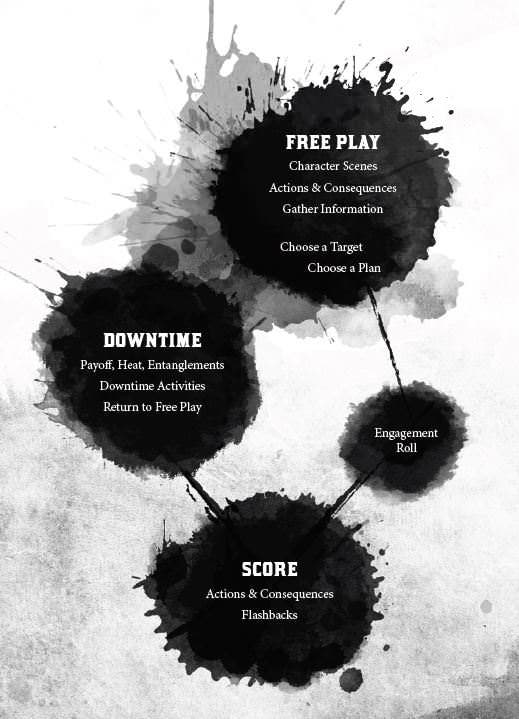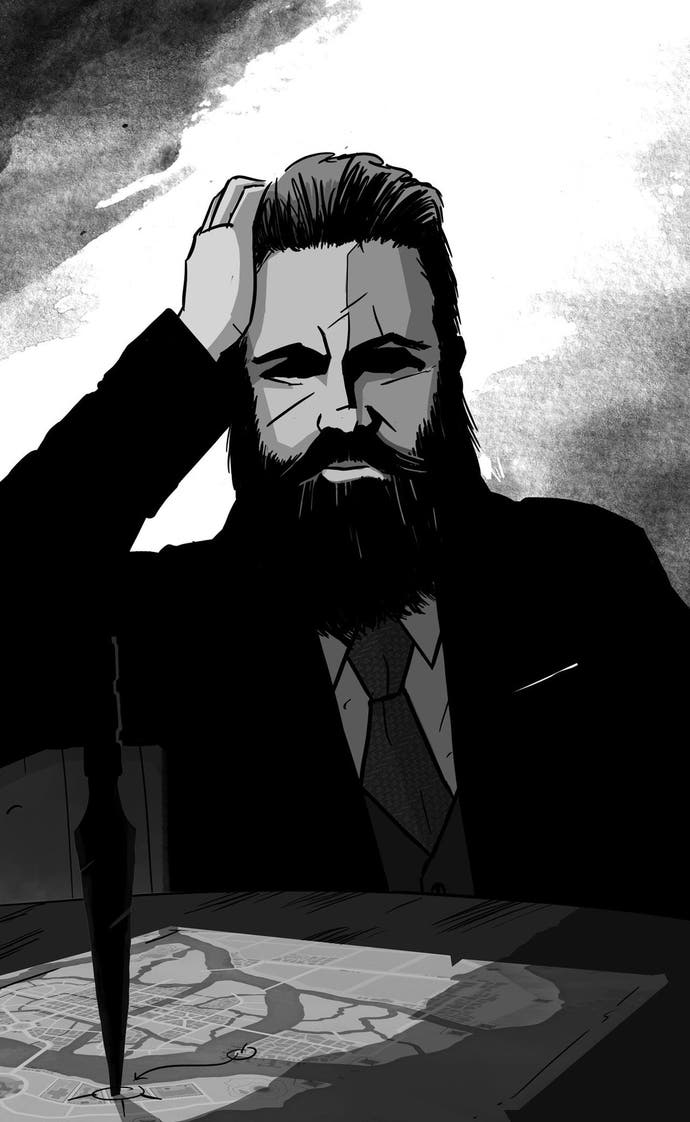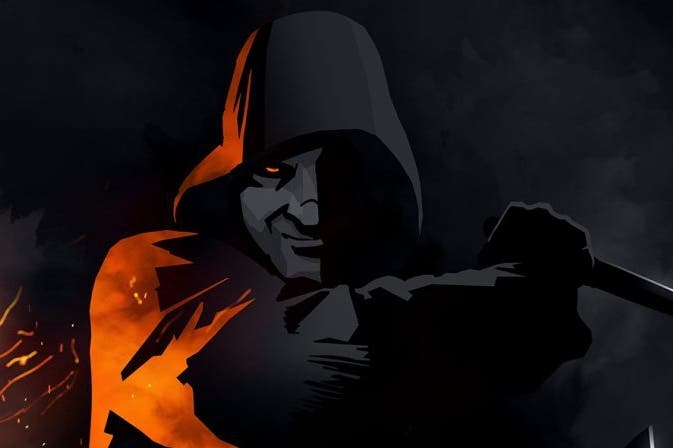How a pen and paper RPG made me fear my friends
Bad Consequences.
I've been playing a lot of Blades in the Dark recently - it might just be the best pen and paper role playing game I've ever encountered. Blades is an RPG in which the players form a fledgling criminal gang in the grimy industrial city of Duskvol, pulling off daring heists and trying to stay one step ahead of their enemies and the long arm of the law. What makes it truly special, however, are the mechanics aimed at making the experience as sleek and swift as possible, because if there's one thing from which pen and paper RPGs suffer, it's an overabundance of planning. No matter the size of an encounter, players love to try and concoct a plan to cover all bases - an irresistible exercise in frustration, as the best laid plans of mice and men and tabletop role players gang always agley.
What sets Blades in the Dark apart from the competition, meanwhile, is that planning ahead is explicitly, systematically banned. The players name the target of their next score, declare roughly how they're going to approach it (by stealth, deception, assault etc), and then the action cuts immediately to that encounter. 'You're stealing an emerald from Viscount Ewens' mansion? Sneaking in? Great. You're at the window on the second floor, trying to pick the lock...'
It's a Spartan framework to be sure, but that's not to say that you can't plan at all in Blades in the Dark; it's just that you're not allowed to plan ahead. You plan behind. At any point during a score, a player can call for a flashback in which they try to make preparations for just this type of eventuality. When trying to sneak into a ball, say, they might call a flashback to the evening before when one of the players bribed a butler to slip them a few blank invitations. A roll determines how well that attempt went, we flash back to the action, the players have a plan in place and nobody wasted 20 minutes debating the various ways getting past the front door might play out. It's razor sharp stuff, supported by a few other great mechanics that I, sadly, haven't the space to talk about.

All of this is to say that, in addition to being wonderfully swift, Blades puts a lot of control in the hands of the players - something I've had a lot of time to think about recently, because I'm about halfway through running my first campaign and I've slowly come to the realisation I am playing with a group of monsters. Now, I love my friends dearly, but I think they'd be the first to agree they've done some unspeakable things in the name of getting ahead. Goodfellas looks like a bit of whimsy by comparison, to be perfectly frank.
When I first started running the game last year, everybody made their characters and decided what type of gang they wanted to be. They decided to become a gang of confidence tricksters and sneak thieves - ghosting out with the loot without a soul knowing who they really were. Please bear that fact in mind as you read the rest of this article. When given the opportunity to name the gang, they decided to just roll with it for a session or two and see what felt appropriate after that.
The gang is now called The Bad Consequences. I could write an entire dissertation on The Stunts They've Pulled on the poor, unsuspecting city of Duskvol but, for expediency's sake, here are some choice highlights.
In their second ever session, The Bad Consequences planned to take some turf (a bootleg distillery) from a rival gang. Seeing that the front door was locked and guarded, they left and murdered the gang's leader and burned down his headquarters just to give them something to talk to the distillery workers about to get them to open the door. They then killed three of the people inside.
Now in control of a still they were purposefully mismanaging, they organised a fake charity ball, killed three or four people and blinded dozens of partygoers on purpose with bootleg moonshine in order to steal the donations box. They had access to this box anyway, on account of having organised the ball, but apparently blinding people was of the utmost importance.
On witnessing their employers' capacity for cruelty, two street urchins running errands for The Bad Consequences quite rightly defected to another gang. Unwilling to bear this insult, the Consequences went and assassinated the head of that rival gang who, to be clear, had no idea who these kids were. They accomplished this by blowing up one of the city's main bridges, killing half a dozen people (including the ex-wife of one of the player characters) and destroying a priceless work of art in the process.
Somewhat understandably, the gang inevitably retaliated, so the Bad Consequences blew up their own still and forfeited their only bit of turf in order to kill as many of their assailants as possible, while simultaneously blowing the roof in on that gang's headquarters. They killed 52 people, destroying three houses and a temple in the process.
To be clear, these anecdotes are just the beginning, but hopefully it's given you some sense of exactly who I'm dealing with around the table. It's not even like I'm being especially gentle with them, either - in blowing up the still and the temple, three of the gang nearly died and one of them was permanently traumatised - and yet they continue to career drunkenly from one outrageous success to another.

Blades is very much a game about overcoming impossible odds, but it's also a very claustrophobic one - Duskvol itself is fairly small, but is also surrounded by a giant wall of lightning. This is in place to keep the ghosts out, because surrounding the city is a savage wasteland full of ravening phantoms. Naturally. Escape, in other words, isn't really an option, so in a game that's all about gathering turf and reputation and crushing your rivals, everything has a knock on effect - and yet, The Bad Consequences keep failing forward. Now I'll freely admit that, as a GM, I like to say yes to my players when they come up with something daft, but even though every success has been genuine - despite the fact their every narrow escape or overwhelming victory has been above board - it's hard to avoid the feeling they're taking the piss just a little bit. And I didn't even tell you about the one that happened in a brothel which, on reflection, sounds unnervingly like a nightmare episode of F.R.I.E.N.D.S. Can you imagine Ross in a fetish dungeon? It doesn't bear thinking about.
Anyway, my point here is that in pen and paper role playing games it's frequently said the only limits are your imagination, but that's something I don't really think rings true. You can imagine whatever you like, of course, but there's always a rule in place to make some things unlikely enough to effectively be impossible. Those constraints are useful, of course, but they are just that - constraints. I have never played a game with such a high ceiling for ludicrosity, meanwhile, as that of Blades in the Dark. It's an absolute delight, even if I think my friends deserve to be arrested.

